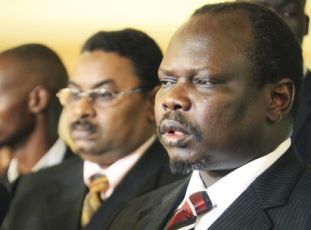Sudan’s north-south talks in Ethiopia agree on seeking debt relief
March 6, 2011 (KHARTOUM) – Sudan’s north-south halves concluded on Friday a six-day round of talks in Ethiopia with an agreement to seek clearance of the country’s hefty external debts, facilitation of trade, division of oil sector firms and introduction of a new currency in the south ahead of its split in July.

South Sudan is due to announce formal independence from the north in July after it voted overwhelmingly for that choice in a referendum in January. The plebiscite marked final phase of the 2005’s Comprehensive Peace Agreement (CPA), which ended decades of civil war between the two sides.
The two sides are negotiating a wide array of post-referendum issues, the most important of which are ownership of the central disputed area of Abyei, currency, oil, Nile water, international agreements and liabilities.
The talks, which were held in the Ethiopian resort town of Debre Zeit and moderated by the African Union High-Level Implementation Panel on Sudan (AUHIP) led by former South African President Thabo Mbeki, agreed to initiate concerted efforts to waive Sudan’s debts.
“In the interests of the economic stability of both states, the two parties agreed to embark on a joint effort to secure debt relief from Sudan’s international creditors” a statement released by the AUHIP said, adding that “further discussions also dealt with the formula for the apportionment of the debt.”
Sudan has been lobbying extensively to secure relief of its external debts – which stood at about $35.7 billion as of December, 31 2009, according to official figures.
The International Monetary Fund said in a report last year that the amount of Sudan’s external debt is projected to reach $37.8 billion in 2010, urging Sudan to keep borrowing under control and introduce large economic reforms in order to qualify for debt relief.
Sudan reduced repayments to its creditors in 2010 and requested a rescheduling of debt services from its main creditors, which include the IMF, World Bank, Kuwait, Saudi Arabia, Austria and the United States.
A paper published by the Center for Global Development said that nearly 90 percent of Sudan’s external debt is owed to bilateral and commercial creditors, with their own requirements, and would take at least three years to clear.
South Sudan officials have in the past said that they do not accept to share the country’s foreign debts, saying that the money was borrowed to finance the northern army to fight southerners in the civil war.
North Sudan on the other hand complained that political discord with the West was standing in the way of its debt relief quest.
Mbeki told reporters in Addis Ababa that both sides had agreed to send a joint team to the spring meetings of the World Bank and the IMF to campaign for debt relief.
Pagan Amum, the secretary-general of the ruling Sudan People’s Liberation Movement in the south, told Reuters that the south is “ready to join the north in joint efforts for debt relief.”
However, he added that the south’s “participation [in debt relief efforts] is conditional to the cooperation of the north in all the other areas including Abyei, as well as also assuming the redemption of the Sudanese currency as we change the currency.”
The two sides also discussed the future of the oil sector and the two state-owned oil companies, Sudapet and Nilepet, according to the AUHIP release.
North and south Sudan are negotiating a new oil sharing deal to replace the existing agreement – which shares revenues roughly 50-50 – before the CPA expires in July.
Most of Sudan’s proven daily output of 500,000 barrel of oil is pumped from oilfields in the south whereas the pipeline infrastructure and the refineries lie in the north.
Both sides need to maintain cooperation on oil although a new deal is likely to give less oil to the north.
It has also been agreed that the south would introduce a new currency after the end of the CPA Interim Period on 8th July 2011, said the panel’s statement.
The two parties also decided to establish a joint committee to consider ways of “facilitating trade and trade-related payment arrangements.” “The joint committee will report to the Parties by the end of May 2011,” said the AUHIP.
North and south Sudan will resume post-referendum talks in Sudan before returning to Ethiopia on April 5 for another round of intensive negotiations, announced the AUHIP.
(ST)
